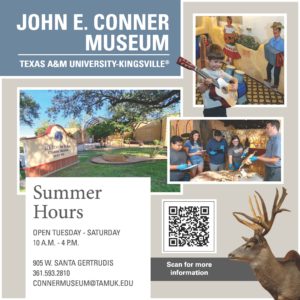Happy birthday, COVID-19
As the anniversary of the COVID-19 pandemic passes, the university reflected on the impact it has had on its students, staff and campus over the past year.
COVID-19 has brought numerous changes to the education process, social interaction and has shed light on social responsibility.
As COVID-19 began to spread globally TAMUK became aware of the threat it posed to campus. On March 5, 2020 students received the first email pertaining to COVID-19 as they left for Spring Break warning students about traveling out of the state and internationally. TAMUK extended students’ Spring Break to prepare for the onset of online classes and the adjustment that would come with it.
TAMUK had to quickly adjust in anticipation of the oncoming global pandemic. One of the most impactful changes due the pandemic was the transition of online learning.
“Having to transition to online learning truly impacted me because it’s hard for me learn anatomy and microbiology. Those are courses that require a lab so it’s always challenging… A year ago, I would have thought COVID-19 would have been over by now,” Lauren Gallegos, kinesiology major, said.
While students adapted to an online platform, the mental health impact of the pandemic became apparent.
“Between the rapid transition to virtual learning and mental health struggles associated with the pandemic, it is clear that our students are also feeling this impact. Eighty-five percent of students surveyed in a recent national survey report that COVID-19 has had a negative impact on their academic performance,” Chief of Staff and Chair of the COVID-19 Response Team Randy Hughes said.
Although the format of education was greatly impacted many students battled financial instability. TAMUK offered the CARES Act in efforts to help students cope with financial uncertainty and help relieve economical burdens brought on by the pandemic.
“COVID-19 has disrupted higher education across the nation, and we’re no different. First, we understand the pandemic has placed an undue financial burden on many of our students and their families who may be coping with job loss and significant medical bills. While we have helped many of these students with added support, these challenges have undoubtedly contributed to students postponing their education or dropping out. Students may also have chosen to pause their education due to a preference for in-person learning,” Hughes said.
However, students were not the only ones struggling to adapt. For many professors who have a hands-on approach, adjusting to online learning came with a toll.
“Some of the challenges I faced due to COVID-19 consisted of limited communication with students, not being able to do group related work with my students in class and seeing my students struggle in their academics due to the stress and anxiety this pandemic has brought,” Academic Success Coach Diana Bustamante said. “I’ve learned that it’s so important to utilize as many resources and techniques to help teach effectively in the classroom, and to have a good support system to get through such difficult times. It’s important that we all support students and staff to ensure academic success through taking care of our physical and mental health.”
Although the mask mandate in Texas is lifted, any and all policies pertaining to COVID-19 continue to stay in place on campus to protect students and staff.
The impact of COVID-19 is still largely felt to today in the many procedures students and staff must follow, but the university is hopeful of a future where students can learn and participate in activities again without the threat of the deadly disease.
Throughout the year TAMUK has offered free COVID-19 testing for students, contact tracing and is now providing students with an opportunity to receive a COVID-19 vaccination.
“We have learned much over the past year about student learning preferences and how best to provide the support and resources needed to ensure student success even in the most challenging of times. It is our intent—if pandemic conditions allow—to offer more face-to-face courses in the fall,” Hughes said.
